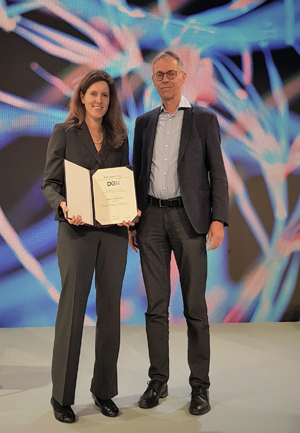Lena Burbulla receives award for Parkinson's research
Lena Burbulla has received the 2023 Parkinson's Prize of the Dr. Friedrich Wilhelm and Dr. Isolde Dingebauer Foundation for her research into the molecular basis of Parkinson's disease and innovative therapeutic approaches. The prize, which is awarded by the German Society of Neurology, has been awarded since 2002 for outstanding scientific achievements in research into Parkinson's disease and other neurodegenerative diseases.
10.11.2023
 Lena Burbulla has been researching Parkinson's disease for 15 years. In the process, she has gained important insights into the pathological basis of the disease, opening up potential new approaches for therapies. She was able to identify a toxic biochemical cascade in dopaminergic neurons, which is caused by a biochemical change in the messenger substance dopamine. She discovered that in nerve cells generated from induced pluripotent stem cells, large amounts of biochemically altered dopamine are produced, which is more toxic than normal dopamine. This pathological dopamine has the ability to bind proteins, change their structure and impair their function. In the long term (e.g. in age-related diseases), this can lead to nerve cell death, as has been shown using the example of the lysosomal enzyme glucocerebrosidase. The enzyme is modified in a harmful way by the pathological dopamine and is therefore less active. This leads to lysosomal dysfunction and ultimately to cell-damaging changes. These new, groundbreaking results were published in the journal Science.
Lena Burbulla has been researching Parkinson's disease for 15 years. In the process, she has gained important insights into the pathological basis of the disease, opening up potential new approaches for therapies. She was able to identify a toxic biochemical cascade in dopaminergic neurons, which is caused by a biochemical change in the messenger substance dopamine. She discovered that in nerve cells generated from induced pluripotent stem cells, large amounts of biochemically altered dopamine are produced, which is more toxic than normal dopamine. This pathological dopamine has the ability to bind proteins, change their structure and impair their function. In the long term (e.g. in age-related diseases), this can lead to nerve cell death, as has been shown using the example of the lysosomal enzyme glucocerebrosidase. The enzyme is modified in a harmful way by the pathological dopamine and is therefore less active. This leads to lysosomal dysfunction and ultimately to cell-damaging changes. These new, groundbreaking results were published in the journal Science.
In the next step, Lena Burbulla, in collaboration with renowned chemists, researched a possible causal therapeutic approach to interrupt this toxic cascade. They developed small molecules that activate the lysosomal glucocerebrosidase, which reduced the pathological dopamine as well as cell damage. As a further therapeutic approach, Lena Burbulla is now pursuing the strategy of drug repurposing by means of high-throughput screening. She is also working on the degeneration of dopaminergic neurons in the very rare, mostly pediatric and lethal NBIA diseases (Neurodegeneration with Brain Iron Accumulation).
Foto: © DGN/Jana Pieper

